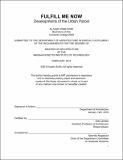| dc.contributor.advisor | Joel Lamere. | en_US |
| dc.contributor.author | Smith, Austin Wade | en_US |
| dc.contributor.other | Massachusetts Institute of Technology. Department of Architecture. | en_US |
| dc.date.accessioned | 2016-07-01T18:23:55Z | |
| dc.date.available | 2016-07-01T18:23:55Z | |
| dc.date.copyright | 2016 | en_US |
| dc.date.issued | 2016 | en_US |
| dc.identifier.uri | http://hdl.handle.net/1721.1/103436 | |
| dc.description | Thesis: M. Arch., Massachusetts Institute of Technology, Department of Architecture, 2016. | en_US |
| dc.description | This electronic version was submitted by the student author. The certified thesis is available in the Institute Archives and Special Collections. | en_US |
| dc.description | Cataloged from student-submitted PDF version of thesis. | en_US |
| dc.description | Includes bibliographical references (pages 108-109). | en_US |
| dc.description.abstract | The experience of the urban inhabitant in the NOW, is a persistent crisis of time management. In the era of accelerated ecommerce, NOWness fulfills and entangles us further with every synaptic push of an Amazon dash button. Our desire increasingly relies upon a vast, networked engine of tightly coupled information management and material handling, promising to move physical stuff through congested cities with the speed and fluidity of data and capital. Once consolidated and remote, this infrastructure must increasingly make contact with our daily lives, and the frictions therein, to ensure customer satisfaction NOW. Our patience contracts. Time intervals diminish. All mail becomes media mail, and the city is further rationalized into a dynamic field of moving parcels / packets. At work, is a fundamental redefinition of the basic spatial units of urban life within the space-time rubric of NOW; one predicated on a smoothness of mobility and logistics. New hybrid typologies of temporal infrastructure will mediate material culture, and operate as social condensers to a public which lives, works, and consumes everywhere, and in the NOW. In the process, the egosphere is disaggregated into the urban; segmented into the functional voxels of our mobile life. These Parcels, the components of our urban time / life-support, the requisite volumes of storage, pickup, sharing, consumption and hygiene, proliferate and coalesce at the intersections of distribution networks all for the sake of efficiency. Here, we are enacting a strange form of commons, building cities at scale, NOW. | en_US |
| dc.description.statementofresponsibility | by Austin Wade Smith. | en_US |
| dc.format.extent | 110 pages | en_US |
| dc.language.iso | eng | en_US |
| dc.publisher | Massachusetts Institute of Technology | en_US |
| dc.rights | M.I.T. theses are protected by copyright. They may be viewed from this source for any purpose, but reproduction or distribution in any format is prohibited without written permission. See provided URL for inquiries about permission. | en_US |
| dc.rights.uri | http://dspace.mit.edu/handle/1721.1/7582 | en_US |
| dc.subject | Architecture. | en_US |
| dc.title | Fulfill me now : developments of the urban parcel | en_US |
| dc.title.alternative | Developments of the urban parcel | en_US |
| dc.type | Thesis | en_US |
| dc.description.degree | M. Arch. | en_US |
| dc.contributor.department | Massachusetts Institute of Technology. Department of Architecture | |
| dc.identifier.oclc | 952413161 | en_US |
